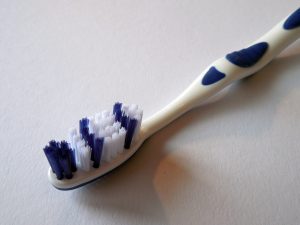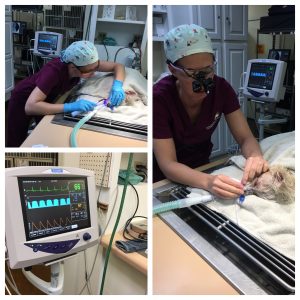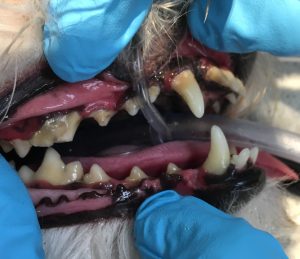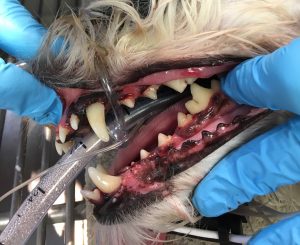During the month of February Spring Branch Veterinary Hospital is offering:
-FREE dental exams with a veterinary technician
-10% OFF DENTAL CLEANINGS
-FREE dental toothbrush kits while supplies last

Can you imagine what your mouth would feel like if you stopped brushing your teeth? Good oral health is very important to your health, and the same is true for your pets. Keeping your pet’s mouth healthy will help prevent periodontal disease. Up to 85% of pets over the age of 3 will have periodontal disease without regular dental care. Periodontal disease involves a bacterial infection affecting the supporting structures around teeth as well as the bone underneath. Periodontal disease leads to tooth loss and painful infections in the mouth. The infection involved in periodontal disease has also been linked to causing heart disease and other internal organ disease. Keeping your pet’s mouth healthy can help them live a healthier longer life. Keeping your pet’s mouth healthy involves both regular teeth brushing as well as routine veterinary dental cleanings.
5 Ways to Keep your Pet’s Mouth Healthy:

1. Beware of Bad Breath
Bad breath can be a warning sign of periodontal disease or other diseases in the mouth. Other warning signs to monitor for include bleeding gums, discolored teeth, loose teeth, pawing at the mouth, or loss of appetite. If you notice any of these signs an examination by a veterinarian is needed
2. Brush Your Pet’s Teeth
Using an enzymatic pet toothpaste to brush your pet’s teeth routinely can help keep their mouth healthy long term. Never use human toothpaste on dogs or cats, it must be a pet specific toothpaste. Most pet toothpaste will have a flavor that is favorable to your pet which will help them enjoy the process. Use a toothbrush with soft  bristles or a finger toothbrush. Slowly introduce your pet to having their teeth brushed by starting with short frequent introductions to the process. Make it a positive experience by offering praise and a treat or toy after they have their teeth brushed. Ideally, brushing your pet’s teeth every day is recommended however brushing a few times a week is still beneficial.
bristles or a finger toothbrush. Slowly introduce your pet to having their teeth brushed by starting with short frequent introductions to the process. Make it a positive experience by offering praise and a treat or toy after they have their teeth brushed. Ideally, brushing your pet’s teeth every day is recommended however brushing a few times a week is still beneficial.
3. Consider Dental Treats
Dental treats are not as effective as brushing however they can promote good oral health. Not all dental
treats are created equal. Ask us for recommendations on the best dental treats or chews for
your pet’s specific needs. Depending on your pet’s specific dental needs, Spring Branch Veterinary Hospital often recommends OraVet dental chews. These dental chews can be purchased in our hospital, and we offer free samples!
4. Take Your Pet for Regular Veterinary Examinations
An examination can reveal many possible oral problems including: tarter buildup, gingivitis, periodontal disease, abscesses, broken or loose teeth, or other diseases. Pets are stoic by nature so they will often hide any pain they are in. Broken or infected teeth are painful if not addressed. Many painful conditions can be missed without routine examinations. It is important for pets to have an examination by a veterinarian at a minimum of once yearly and sooner if any problems are suspected.
5. Last But Not Least, Dental Cleanings are Very Important to Your Pet’s Health
While it varies depending on breed, most dogs and cats need a professional veterinary prophylactic dental cleaning once a year. This procedure is similar to when we have our own teeth cleaned; however the veterinary version requires anesthesia in order to do a thorough cleaning.
What is entailed during a dental cleaning with SBVH?
- Pre-anesthetic bloodwork and examination by a veterinarian.
- General anesthesia with monitoring by a veterinarian and veterinary technician including blood pressure monitoring, EKG monitoring, Pulse-ox monitoring, CO2 monitoring, heart rate/respiratory rate monitoring, temperature monitoring, and IV fluids . Patient’s body temperatures are maintained by warming pads and warmed IV fluids.
- Dental hand instrument scaling and ultrasonic scaling of the teeth and under the gumline.
- Fluoride treatment polish.
- Full-mouth dental X-rays to expose any possible tooth root disease that cannot otherwise be seen.


Before a Dental Cleaning After a Dental Cleaning
While many people hesitate to have their pet’s teeth cleaned due to fears of anesthesia complications, the truth is that safer anesthesia protocols, pre-anesthetic bloodwork, and thorough monitoring make it a very safe process for otherwise healthy pets.
Spring Branch Veterinary Hospital has the ability to address many dental conditions including most loose or infected teeth, fractured teeth, and periodontal disease. Infected teeth are painful and sometimes require extraction (tooth pulling) to alleviate discomfort. Spring Branch Veterinary Hospital also has the ability to do a bonded sealant procedure on teeth that have superficial fractures. This is a procedure that smooths and seals superficial teeth fractures to prevent infection and reduce the risk of further fractures.
If you are not sure if your pet is in need of a dental cleaning, call us for a FREE dental exam by one of our veterinary technicians! Specific concerns can be discussed during an examination/consultation with either Dr Hughes or Dr Baas. Our veterinarians and team are dedicated to customizing a dental treatment plan specific for your pet’s needs.
During the month of February Spring Branch Veterinary Hospital is offering:
-FREE dental exams with a veterinary technician
-10% OFF DENTAL CLEANINGS
-FREE dental toothbrush kits while supplies last
Call us to schedule an exam or a dental cleaning 830-438-7800
Keeping your pet’s mouth healthy will help lead to a happier, healthier, and longer life.
Megan Hughes, DVM
Spring Branch Veterinary Hospital






